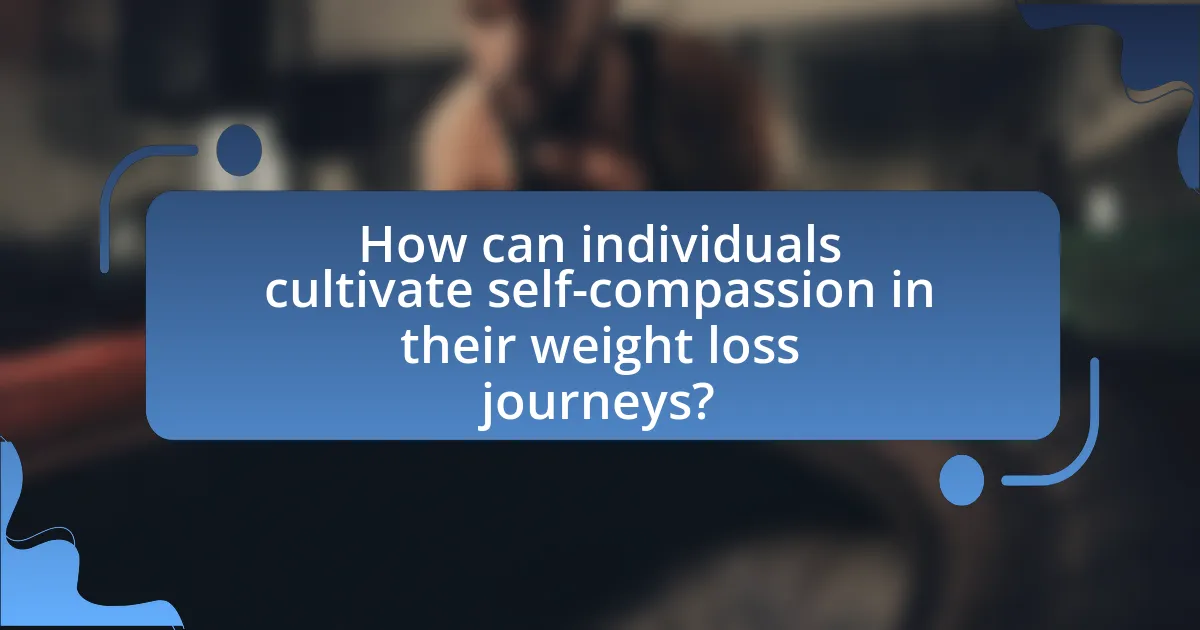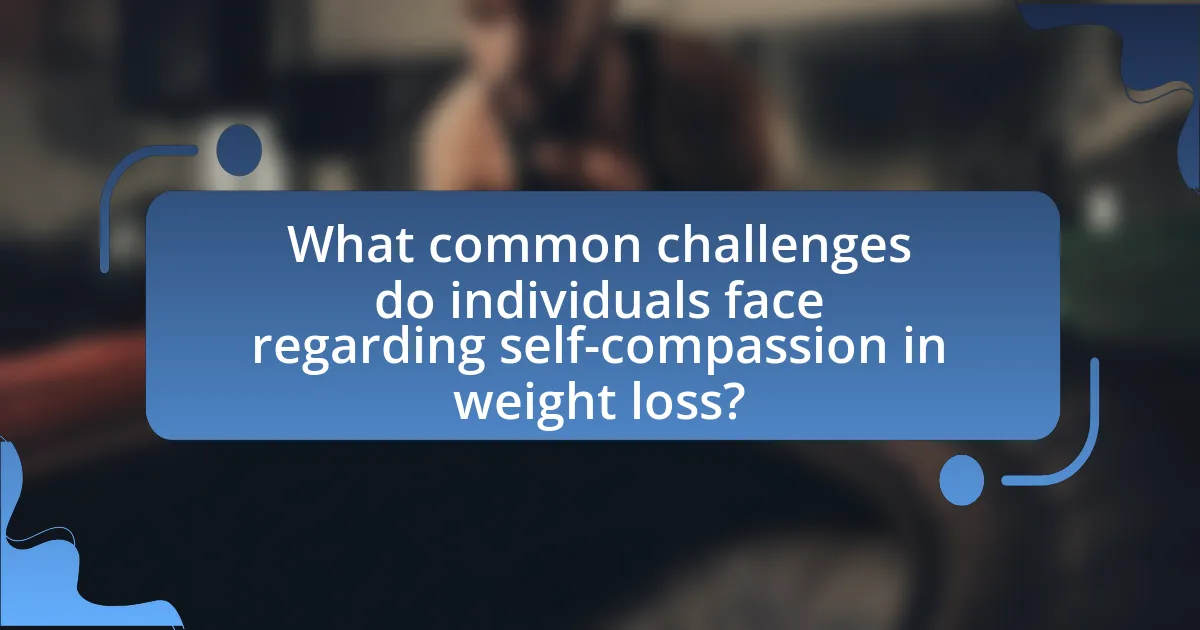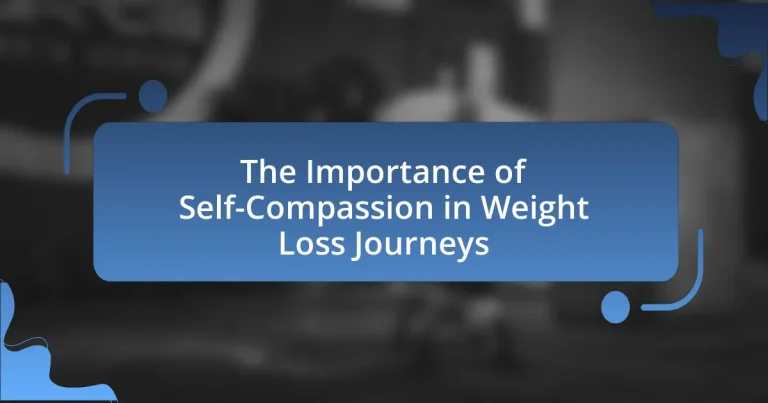The article focuses on the critical role of self-compassion in weight loss journeys, highlighting its impact on emotional well-being, motivation, and resilience. It discusses how self-compassion fosters healthier behaviors, reduces negative self-talk, and helps individuals cope with setbacks, ultimately leading to sustainable weight loss outcomes. Key research findings indicate that self-compassionate individuals are more likely to maintain their weight loss efforts and develop a positive body image. The article also provides practical strategies for cultivating self-compassion, such as mindfulness practices and positive affirmations, emphasizing its importance for long-term success in weight management.

What is the role of self-compassion in weight loss journeys?
Self-compassion plays a crucial role in weight loss journeys by fostering a positive mindset that enhances motivation and resilience. Research indicates that individuals who practice self-compassion are more likely to engage in healthier behaviors and maintain their weight loss efforts over time. A study published in the journal “Health Psychology” by Breines and Chen (2012) found that self-compassionate individuals are less likely to experience negative emotions related to setbacks, which can lead to healthier coping strategies and sustained commitment to weight loss goals. This supportive self-approach encourages individuals to treat themselves with kindness during challenges, ultimately promoting a more effective and sustainable weight loss journey.
How does self-compassion influence emotional well-being during weight loss?
Self-compassion significantly enhances emotional well-being during weight loss by fostering a supportive mindset that reduces negative self-criticism. Research indicates that individuals who practice self-compassion experience lower levels of anxiety and depression, which are common barriers to successful weight loss. A study published in the journal “Health Psychology” by Breines and Chen (2012) found that self-compassionate individuals are more likely to engage in healthy behaviors and maintain motivation, as they approach setbacks with understanding rather than harsh judgment. This supportive approach not only promotes resilience but also encourages a healthier relationship with food and body image, ultimately leading to more sustainable weight loss outcomes.
What are the psychological benefits of practicing self-compassion while losing weight?
Practicing self-compassion while losing weight offers significant psychological benefits, including reduced anxiety and improved emotional resilience. Research indicates that individuals who engage in self-compassion are less likely to experience negative self-talk and are more capable of coping with setbacks, which is crucial during weight loss journeys. A study published in the journal “Health Psychology” by Breines and Chen (2012) found that self-compassionate individuals reported higher motivation and lower levels of body dissatisfaction, leading to healthier weight management behaviors. This suggests that self-compassion not only fosters a positive mindset but also enhances overall well-being, making it a vital component of successful weight loss efforts.
How does self-compassion help in overcoming setbacks during weight loss?
Self-compassion helps individuals overcome setbacks during weight loss by fostering a supportive inner dialogue that reduces self-criticism and promotes resilience. Research indicates that individuals who practice self-compassion are more likely to maintain motivation and engage in healthier behaviors after experiencing setbacks, as they view these challenges as part of the learning process rather than failures. A study published in the journal “Health Psychology” by Breines and Chen (2012) found that self-compassionate individuals showed greater persistence in their weight loss efforts after encountering difficulties, highlighting the role of self-kindness in enhancing emotional well-being and commitment to goals.
Why is self-compassion essential for sustainable weight loss?
Self-compassion is essential for sustainable weight loss because it fosters a positive mindset that encourages healthier behaviors and resilience in the face of setbacks. Research indicates that individuals who practice self-compassion are more likely to engage in self-care activities, such as healthy eating and regular exercise, rather than resorting to negative self-talk or punitive measures when they encounter challenges. A study published in the journal “Health Psychology” by Breines and Chen (2012) found that self-compassionate individuals showed greater motivation to improve their health and were less likely to engage in binge eating after experiencing a setback. This supportive approach helps maintain long-term commitment to weight loss goals, making self-compassion a critical factor in achieving and sustaining weight loss.
How does self-compassion affect motivation and commitment to weight loss goals?
Self-compassion positively affects motivation and commitment to weight loss goals by fostering a supportive mindset that encourages persistence and resilience. Research indicates that individuals who practice self-compassion are more likely to engage in healthy behaviors and maintain their weight loss efforts over time. A study published in the journal “Health Psychology” by Breines and Chen (2012) found that self-compassionate individuals showed greater motivation to pursue their goals and were less likely to give up after setbacks. This supportive approach reduces negative self-talk and promotes a healthier relationship with food and exercise, ultimately enhancing commitment to weight loss objectives.
What role does self-compassion play in developing a positive body image?
Self-compassion significantly contributes to developing a positive body image by fostering a kinder and more accepting attitude towards oneself. Research indicates that individuals who practice self-compassion are less likely to engage in negative self-talk and body dissatisfaction, which are common barriers to a healthy body image. A study published in the journal “Body Image” by Neff and Vonk (2009) found that self-compassionate individuals reported higher levels of body appreciation and lower levels of body shame. This suggests that self-compassion not only mitigates negative feelings about one’s body but also enhances overall body positivity, making it a crucial element in the journey towards a healthier self-image.

How can individuals cultivate self-compassion in their weight loss journeys?
Individuals can cultivate self-compassion in their weight loss journeys by practicing mindfulness, reframing negative thoughts, and treating themselves with kindness. Mindfulness allows individuals to become aware of their thoughts and feelings without judgment, which can reduce self-criticism. Research by Neff (2011) indicates that self-compassion is linked to greater emotional resilience and well-being, suggesting that individuals who engage in self-compassionate practices are more likely to maintain motivation and commitment to their weight loss goals. Reframing negative thoughts involves recognizing and challenging unhelpful beliefs about weight loss and self-worth, which can foster a more supportive internal dialogue. Treating oneself with kindness, especially during setbacks, reinforces a positive self-image and encourages persistence in the weight loss journey.
What practical strategies can enhance self-compassion during weight loss?
Practical strategies to enhance self-compassion during weight loss include practicing mindfulness, reframing negative thoughts, and setting realistic goals. Mindfulness allows individuals to observe their thoughts and feelings without judgment, fostering a compassionate attitude towards themselves. Reframing negative thoughts involves recognizing self-criticism and replacing it with supportive affirmations, which can improve emotional resilience. Setting realistic goals helps to create achievable milestones, reducing feelings of failure and promoting a kinder self-view. Research indicates that self-compassion is linked to greater motivation and healthier behaviors, as shown in a study published in the journal “Health Psychology” by Neff and Germer, which highlights the positive impact of self-compassion on well-being during challenging processes like weight loss.
How can mindfulness practices support self-compassion in weight loss?
Mindfulness practices support self-compassion in weight loss by fostering a non-judgmental awareness of thoughts and feelings related to body image and eating behaviors. This awareness allows individuals to recognize negative self-talk and replace it with kinder, more supportive internal dialogue. Research indicates that mindfulness can reduce emotional eating and increase self-acceptance, which are crucial for sustainable weight loss. A study published in the journal “Mindfulness” by Keng, Smoski, and Robins (2011) found that mindfulness practices enhance emotional regulation and self-compassion, leading to healthier lifestyle choices. By cultivating self-compassion through mindfulness, individuals are more likely to engage in positive behaviors that support their weight loss goals.
What affirmations can individuals use to foster self-compassion?
Individuals can use affirmations such as “I am worthy of love and kindness,” “I forgive myself for past mistakes,” and “I embrace my imperfections as part of my journey” to foster self-compassion. These affirmations encourage a positive self-dialogue, which is essential for developing a compassionate mindset. Research indicates that self-compassion is linked to greater emotional resilience and well-being, making these affirmations effective tools in promoting a healthier relationship with oneself, particularly during challenging weight loss journeys.
How does self-compassion relate to self-care in weight loss?
Self-compassion significantly enhances self-care in weight loss by fostering a supportive mindset that encourages healthier behaviors. Individuals who practice self-compassion are more likely to engage in self-care activities, such as mindful eating and regular exercise, rather than resorting to self-criticism or unhealthy coping mechanisms. Research by Neff and Germer (2013) indicates that self-compassion promotes emotional resilience, which can lead to more sustainable weight loss efforts. Furthermore, a study published in the journal “Health Psychology” found that self-compassionate individuals are less likely to experience emotional eating, thereby improving their overall weight management strategies.
What self-care practices can promote self-compassion during weight loss?
Self-care practices that promote self-compassion during weight loss include mindfulness meditation, journaling, and positive self-talk. Mindfulness meditation helps individuals become aware of their thoughts and feelings without judgment, fostering a compassionate mindset. Research indicates that mindfulness can reduce stress and improve emotional regulation, which is crucial during weight loss (Keng, Smoski, & Robins, 2011). Journaling allows individuals to reflect on their experiences and emotions, helping them process setbacks and celebrate progress, thereby enhancing self-acceptance. Positive self-talk encourages individuals to replace negative thoughts with affirming statements, which has been shown to improve self-esteem and motivation (Seligman, 2011). These practices collectively support a compassionate approach to weight loss, promoting emotional well-being and resilience.
How can individuals balance self-discipline and self-compassion in their weight loss efforts?
Individuals can balance self-discipline and self-compassion in their weight loss efforts by setting realistic goals while allowing for flexibility in their approach. Research indicates that self-compassion fosters resilience, which can enhance motivation and adherence to weight loss plans. For instance, a study published in the journal “Health Psychology” found that individuals who practiced self-compassion were more likely to maintain healthy behaviors over time, as they were less likely to engage in negative self-talk after setbacks. This combination of structured discipline, such as regular exercise and healthy eating, alongside a compassionate mindset that acknowledges human imperfection, creates a sustainable path to weight loss success.

What common challenges do individuals face regarding self-compassion in weight loss?
Individuals commonly face challenges such as negative self-talk, unrealistic expectations, and fear of failure regarding self-compassion in weight loss. Negative self-talk can undermine motivation and lead to feelings of shame, making it difficult for individuals to practice self-kindness. Unrealistic expectations often result in disappointment and frustration when progress does not meet personal standards, which can hinder the development of a compassionate mindset. Additionally, the fear of failure can prevent individuals from embracing self-compassion, as they may equate self-acceptance with giving up on their goals. Research indicates that self-compassion is linked to greater emotional resilience and better weight management outcomes, highlighting the importance of addressing these challenges for effective weight loss journeys.
Why do many struggle with self-criticism during weight loss journeys?
Many individuals struggle with self-criticism during weight loss journeys due to unrealistic expectations and societal pressures. These expectations often stem from media portrayals of ideal body images, leading to feelings of inadequacy when progress does not meet these standards. Research indicates that self-criticism can hinder motivation and increase stress, which negatively impacts weight loss efforts. A study published in the journal “Health Psychology” found that individuals who practice self-compassion are more likely to maintain healthier behaviors and experience greater emotional well-being, highlighting the importance of fostering a supportive inner dialogue during weight loss.
How can individuals identify and combat negative self-talk related to weight loss?
Individuals can identify and combat negative self-talk related to weight loss by actively monitoring their thoughts and challenging negative beliefs. Self-awareness is crucial; individuals should keep a journal to track instances of negative self-talk, noting triggers and contexts. Cognitive Behavioral Therapy (CBT) techniques can be employed to reframe these thoughts into positive affirmations, promoting a healthier mindset. Research indicates that practicing self-compassion can significantly reduce negative self-talk, as shown in a study published in the Journal of Health Psychology, which found that individuals who engaged in self-compassionate practices experienced lower levels of body dissatisfaction and improved emotional well-being.
What impact does societal pressure have on self-compassion in weight loss?
Societal pressure negatively impacts self-compassion in weight loss by fostering unrealistic standards and promoting self-criticism. Individuals often internalize societal ideals of body image, leading to feelings of inadequacy when they do not meet these expectations. Research indicates that higher levels of societal pressure correlate with lower self-compassion, as individuals may judge themselves harshly for perceived failures in their weight loss efforts. A study published in the journal “Body Image” found that individuals exposed to media portrayals of thinness reported decreased self-compassion and increased body dissatisfaction, which can hinder their weight loss journey.
What are the long-term benefits of integrating self-compassion into weight loss journeys?
Integrating self-compassion into weight loss journeys leads to improved emotional well-being and sustainable behavior change. Research indicates that individuals who practice self-compassion experience lower levels of anxiety and depression, which can enhance motivation and adherence to weight loss plans. A study published in the journal “Health Psychology” by Breines and Chen (2012) found that self-compassionate individuals are more likely to engage in healthy behaviors and less likely to resort to unhealthy coping mechanisms, such as emotional eating. This supportive mindset fosters resilience, allowing individuals to navigate setbacks without self-criticism, ultimately contributing to long-term weight management success.
How does self-compassion contribute to maintaining weight loss over time?
Self-compassion contributes to maintaining weight loss over time by fostering a positive mindset that encourages resilience and reduces the likelihood of emotional eating. Research indicates that individuals who practice self-compassion are more likely to engage in healthy behaviors and less likely to experience negative emotions related to weight management. A study published in the journal “Health Psychology” by Breines and Chen (2012) found that self-compassionate individuals showed greater motivation to pursue health goals and were more forgiving of setbacks, which is crucial for long-term weight maintenance. This supportive internal dialogue helps individuals navigate challenges without resorting to unhealthy coping mechanisms, thereby promoting sustained weight loss.
What positive lifestyle changes can result from a self-compassionate approach to weight loss?
A self-compassionate approach to weight loss can lead to several positive lifestyle changes, including improved emotional well-being, healthier eating habits, and increased physical activity. Research indicates that individuals who practice self-compassion are more likely to engage in positive health behaviors, as they tend to be less critical of themselves and more forgiving of setbacks. For instance, a study published in the journal “Health Psychology” found that self-compassion is associated with lower levels of disordered eating and greater motivation to maintain a healthy lifestyle. This suggests that self-compassion fosters a supportive mindset that encourages sustainable weight loss and overall health improvements.
What are some effective tips for practicing self-compassion in weight loss journeys?
Effective tips for practicing self-compassion in weight loss journeys include acknowledging feelings of struggle, reframing negative self-talk, and celebrating small achievements. Acknowledging feelings allows individuals to recognize their challenges without judgment, fostering a supportive mindset. Reframing negative self-talk involves replacing critical thoughts with kinder, more understanding phrases, which has been shown to improve emotional well-being. Celebrating small achievements reinforces positive behavior and encourages continued progress, as research indicates that recognizing incremental successes can enhance motivation and self-esteem.


